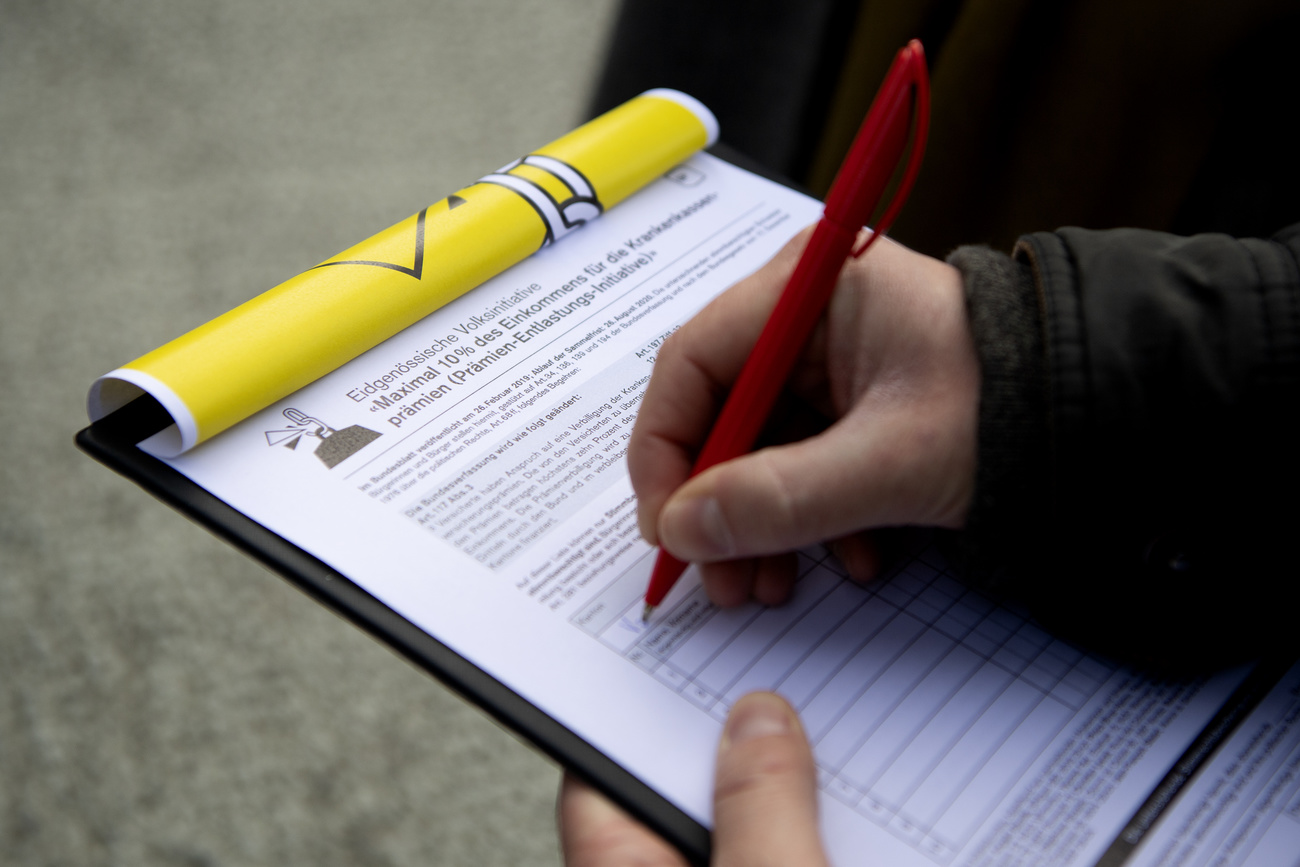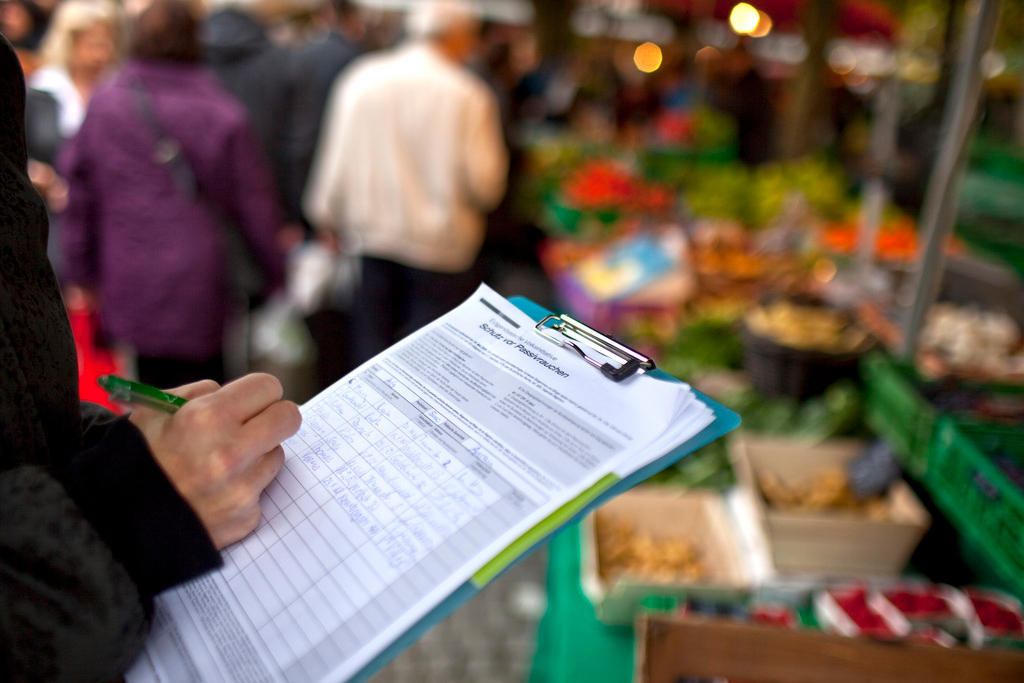Virus continues to infect citizen initiatives and referendums

While democracy relies on people coming together, measures to contain Covid-19 are keeping them apart. In Switzerland and elsewhere in Europe, citizen campaigners are struggling to adapt.
Eight months after the arrival of Covid-19 and a nationwide shutdown, political life in Switzerland seems almost back to business. Plexiglass-protected parliamentarians met for the autumn session, demonstrations are again allowed (under conditions), and most votes and local elections are going ahead as planned.
But the reality is different for campaigners behind people’s initiatives and referendums, the two key instruments of the Swiss direct democracy system. While on paper they can go out onto the street and gather support, the pandemic is slowing them down.
“It’s definitely more difficult to collect signatures,” said one campaigner from the Communist Swiss Labour Party, canvassing in Bern last weekend for a local initiative demanding free public transport. Not only are there fewer people on the street, but social distancing rules and the added barrier of a mask means they are less keen to be approached, he said.
Campaigners at the national level say similar things. Felix Hupfer, speaking on behalf of an initiative opposing 5G technology, told SWI swissinfo.ch that after the enforced pause in campaigning during the spring lockdown, the return to street canvassing has been “sluggish”. “People tend to make a detour around you,” he said.
Some campaigns have thrown in the towel altogether, discouraged not only by the difficult conditions but also the general lassitude among a population focussed on health and the pandemic. “Citizens seem to have other priorities at the moment,” said politician Yvette Estermann recently as she announced the withdrawal of a campaign to abolish Daylight Saving Time in the country.
Challenging laws
What are the consequences of these dropped campaigns and signatures left un-gathered?
When it comes to people’s initiatives, at least, the numbers speak for themselves: just one has been launched since March of this year, compared with a dozenExternal link for the same period in 2019. This is unlikely to lead to any immediate abuses of the democratic process, since such initiatives are generally long-term projects that don’t come to vote until years after being launched. Rather, the inactivity now might lead to a “catch-up” flurry of initiatives being launched next year, or whenever the pandemic ends, says Silvano Moeckli of the University of St Gallen.
However, Moeckli reckons the problems with collecting signatures for referendums – 50,000 signatures are needed within a period of three months to challenge a new law passed in parliament – could have an important impact on the political decision-making process.
“When drafting a law, the parliamentary majority always weighs up if it will be challenged by a referendum, and how much chance of success this referendum would have,” he told swissinfo.ch. “If this possibility is less likely, they won’t have to make so many compromises in drafting the law. This would undermine an important function of the referendum instrument.”
The Tribune de Genève newspaper reportsExternal link that such fears, and the pandemic-era difficulties in collecting signatures for a referendum, is resulting in consternation across the political divide. Left-wing campaigners challenging the new CO2 law passed by parliament (they say it’s too weak) have demanded a suspension of the three-month deadline to collect signatures; right-wing campaigners against the same law (they say it’s too strong) have demanded the same, so far to no avail.
“It’s no longer possible to collect signatures in the streets of our towns and villages without flouting the health measures. We refuse to be spreaders of the virus!” wroteExternal link the left-wing climate campaigners.
Ironically, another of the rare referendums currently collecting signatures at the national level has not called on the government to adjust the rules: the referendum launched against the so-called Covid law underpinning the government’s action against the pandemic.
This referendum group has also faced difficulties on the street, according to spokesman Christoph Pfluger, and not only due to social distancing: also because of “hostile reactions” of some who see them as coronavirus-sceptics. But as the group’s president Werner Boxler told the Tribune de Genève, asking for a suspension of signatures would not only go against their values; it would also mean that the Covid law which they want to combat would continue unchallenged.
Plan B
Faced with the blockages, federal authorities in Bern have introduced some mitigation measures, including a waivingExternal link of the usual obligation to verify signatures with local authorities. But they have held back from making any bigger changes such as extending collection deadlines again or lowering the number of signatures required.
So it’s been up to campaigners to react to the situation, some with intensive online strategies where they offer to mail a hard copy of the signature sheet to citizens. Others have re-raised the issue of collecting signatures electronically – “e-collecting” – which is currently not an official option in Switzerland.

More
Despite Covid-19, digital signature collection has not taken off
Whether such digital options would be enough to vaccinate direct democracy campaigns is another question. At the European level, where one million signatures from at least seven member states are needed to put a European Citizen’s Initiative (ECIExternal link) before the European Commission, collection is and always has been done online. But this doesn’t make it immune to the virus.
Nils Kluger, organiser of a pan-European initiative to ban the trade of shark fins, says Covid-19 has also severely impacted his group’s campaigning. Just because signatures are online doesn’t mean supporters don’t campaign and collect in the real world, he told SWI swissinfo.ch.
“Our plan was to be on the ground this spring, and to collect signatures at various events involving, for example, divers,” Kluger said. Due to the pandemic, he has been forced to run a “totally different campaign”, mostly online. As a result, the initiative is “struggling”, though he says he understands why citizens would have other things on their minds right now. So far, his group has some 133,000 signatures towards the goal of one million by July next year.
As for citizens, are they also clamouring to regain the democratic opportunities dampened by the pandemic? The number of protests around Switzerland and Europe, held both despite and because of the pandemic, show that they at least remain engaged.
And people are voting: almost 60% of Swiss participated in the last national ballot in September, the highest turnout in years. For the next vote on November 29, pollsters reckon about 50% of Swiss will cast their ballot – again slightly above average. Under current conditions, they might be reluctant to give their signature, but they are still keen to have a say.

In compliance with the JTI standards
More: SWI swissinfo.ch certified by the Journalism Trust Initiative













Join the conversation!